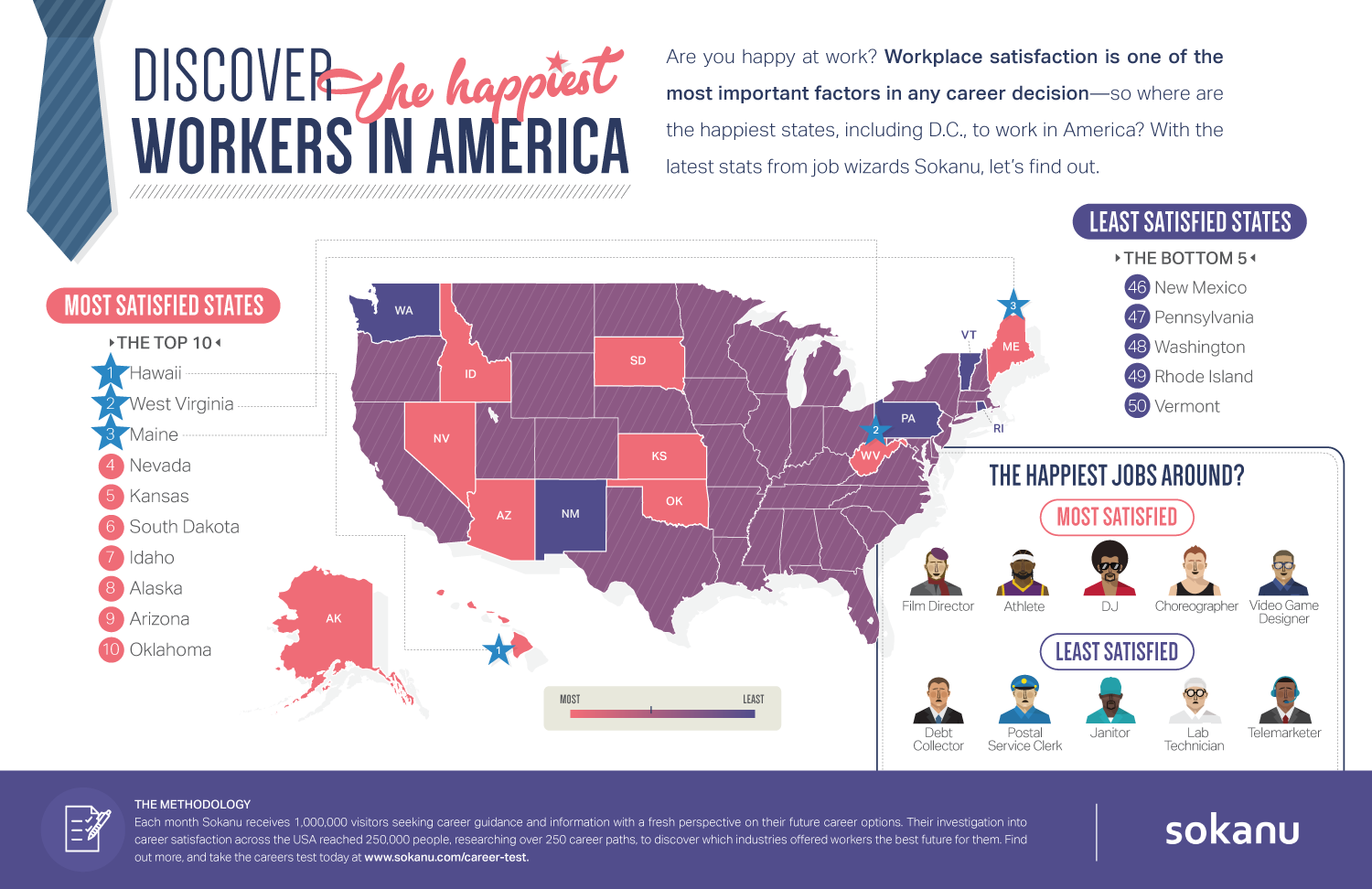Revealed: The Most Satisfying Careers in the U.S.

Are you one of the lucky ones – one of the few people happy in their career? Or do you rank among the majority of workers in America, dissatisfied with your job and not sure what to do about it?
Research shows that less than one-third of workers in the U.S. are engaged in their work, and this figure is even lower for millennials. The overwhelming number of dissatisfied workers suggests that people are having trouble finding the right careers.
But the situation is far from hopeless. The folks at Sokanu, which offers a test that aims to help people find their ideal careers, recently surveyed more than 250,000 workers to find out about the most – and least – satisfying careers in the U.S.
According to the data, the top five most satisfying careers are:
- Film director
- Athlete
- D.J.
- Choreographer
- Video game designer
The least satisfying are:
- Debt collector
- Post office clerk
- Janitor
- Lab technician
- Telemarketer
Sokanu also looked into which states have the happiest workers. Hawaii, West Virginia, and Maine are leading the pack, while Washington State, Rhode Island, and Vermont have least engaged employees.
It’s interesting to note that all but one of the most satisfying careers feature a strong creative element, which is noticeably absent from the least satisfying careers.
“Creativity is vital to a satisfying career,” explains Spencer Thompson, founder of Sokanu. “The unhappiest category of careers on our list is law, with its notoriously stringent and unbending devotion to rules and exactness.”
“On the other end of the spectrum, highly creative careers like those in film, music, and the performing arts rate highly in satisfaction,” Thompson continues. “The opportunity for creativity in a career … could be vital to your overall happiness.”
Another major difference between the most and least satisfying careers is the level of autonomy involved. For example, film directors and game designers not only have the freedom to express themselves artistically, but also generally have the freedom to choose how and when they work. Meanwhile, post office clerks and telemarketers tend to work according to strict schedules set by others.

Is there a recipe for finding the perfect career? We’ve put together some top tips on how to choose a more satisfying job:
1. Know Your Preferences
Do you feel the need to be creative, or do you prefer carrying out a list of set tasks? Do you like change, or are you more wedded to routine? There are no right or wrong answers, but the more you know about yourself, the better equipped you’ll be to find a satisfying job.
2. Do Your Research
Rather than flitting from one job to another – a trend increasingly common with millennials in particular – research a couple of careers you think might suit you. Compiling a pro and con list can help. Talk to people who do those jobs, look into the work culture of potential employers, and check out job descriptions online.
3. Have Confidence
If you’ve been unhappy in your career for a while, it’s easy to lose confidence in your abilities. Make a list of 10 reasons you’re a great person to have in the workplace and 10 things you can bring to your ideal job. Then seize the day: Refresh your resume, send off applications (even if speculative), and grab any opportunities that come along.
4. Prioritize Your Wants
Let’s face it: There aren’t that many film directors in Hawaii, and most of us won’t land careers that fully satisfy all our desires. Be realistic about what’s most important to you. Write a list of the 10 crucial things you want out of your next job, and then find a career that can give them to you.
5. Do What You Like
You’ve probably heard the command to “do what you love,” but unless you’re one of the lucky few whose burning passions match their skills perfectly, that may be unrealistic. Sorry! But that doesn’t mean you have to accept a bad career. Instead, you can focus on what you like doing and how you like to work.
Irma Hunkeler works for BlueGlass.co.uk, a digital marketing agency.

